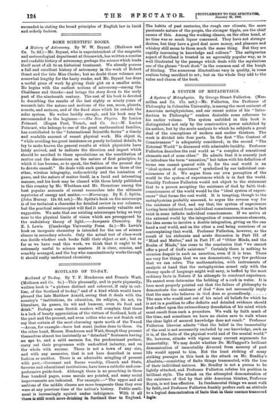SOME SCIENTIFIC BOOKS.
A History of Astronomy. By W. W. Bryant. (Methuen and Co. 7s. 6d.)—Mr. Bryant, who is superintendent of the magnetic and meteorological department at Greenwich, has written a concise and readable history of astronomy, perhaps the science which lends itself most of all to an historical treatment. We already possess a full and excellent history of astronomy in the work of Robert Grant and the late Miss Clone; but no doubt these volumes are somewhat lengthy for the hasty reader, and Mr. Bryant has done a useful piece of work by giving their gist on a smaller scale. He begins with the earliest notions of astronomy—among the Chaldeans and Greeks—and brings the story down to the early part of the nineteenth century. The rest of his book is devoted to describing the results of the last eighty or ninety years of research into the nature and motions of the sun, moon, planets, comets, and meteors, and of the fixed stars which lie outside the solar system. He writes lucidly enough, and his book may be recommended to the beginner.—The New Physics. By Lucien Poincare. (Began Paul, Trench, and Co. 5s.)—M. Lucien Poincare, who belongs to one of the great mathematical families, has contributed to the "International Scientific Series" a timely and readable account of recent physical work. His object is, "while avoiding too great insistence on purely technical details, to try to make known the general results at which physicists have lately arrived, and to indicate the direction and import which should be ascribed to those speculations on the constitution of matter and the discussions on the nature of first principles, to which it has become, so to speak, the fashion of the present day to devote oneself." He deals with such questions as those of the ether, wireless telegraphy, radio-activity and the ionisation of gases, and the nature of matter itself, in a lucid and interesting manner, and his book may be classed with those lately published in this country by Mr. Whetham and Mr. Shenstone among the best popular accounts of recent researches into the ultimate mysteries of energy and matter.—Microscopy. By E. J. Spitta. (John Murray. 12s. 6d. net.)—Mr. Spitta's book on the microscope is of too technical a character for detailed review in our columns, but the practical microscopist will find it extremely valuable and suggestive. We note that our existing microscopes bring us very near to the physical limits of vision which are presupposed by the undulatory theory of light.—Inorganic Chemistry. By
E. I. Lewis. (Cambridge University Press. 5s.)—Mr. Lewis's book on inorganic chemistry is intended for the use of science classes in secondary schools. Only the actual test of class-work can decide whether such books fulfil their object or not ; but so far as we have read this work, we think that it ought to be extremely useful to science masters. It is clear, concise, and sensibly arranged, and the boy who conscientiously works through it should really understand chemistry.




















































 Previous page
Previous page